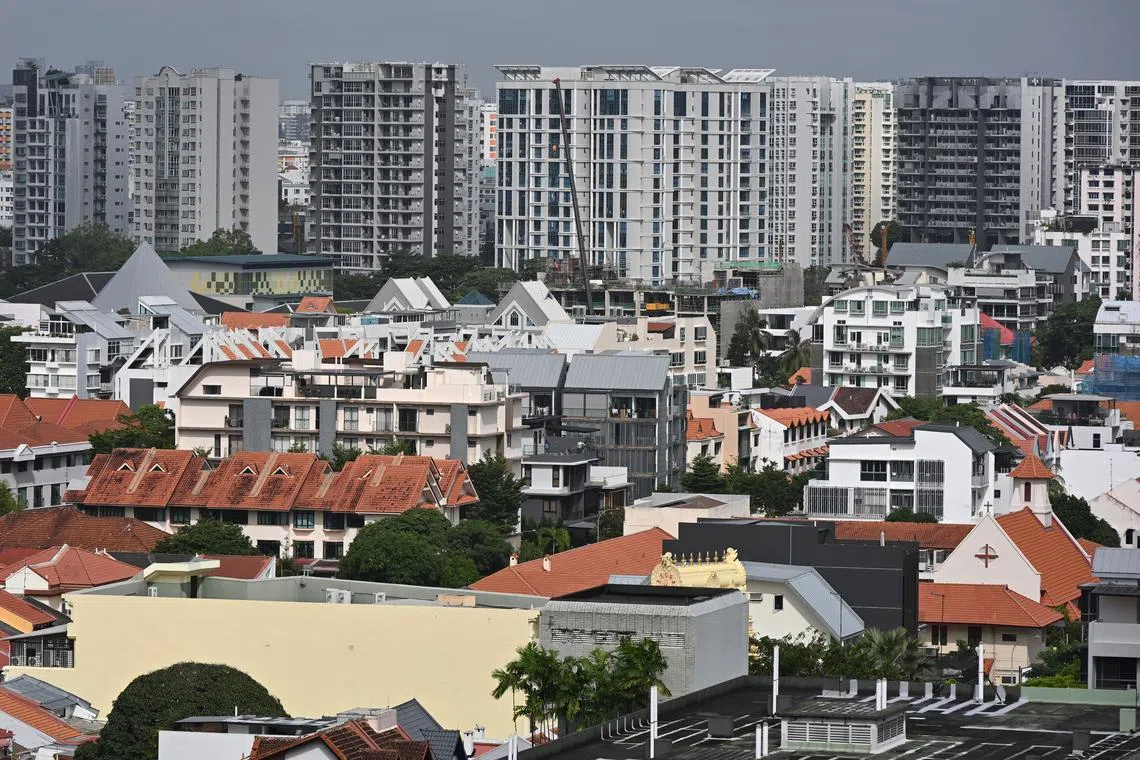Budget 2024: Some home owners to pay lower property tax with raising of annual value bands from 2025
Sign up now: Get ST's newsletters delivered to your inbox

The lowest threshold will be raised from $8,000 to $12,000 and the highest band from over $100,000 to over $140,000 from 2025.
PHOTO: ST FILE
Follow topic:
SINGAPORE - Some home owners will pay lower property taxes, after the annual value bands for owner-occupied residential properties are raised from Jan 1, 2025.
The raising of the bands for calculating property tax rates comes after a significant increase in market rents from 2022 led to more owner-occupied properties being affected by a recent tax hike than anticipated.
The lowest threshold will be raised from $8,000 to $12,000, and the highest band raised from over $100,000 to over $140,000 from 2025, Deputy Prime Minister and Finance Minister Lawrence Wong said on Feb 16. Corresponding adjustments will be made to the bands in between.
With the change, home owners can expect to pay the same or lower property taxes, according to the Ministry of Finance (MOF). This is assuming their property’s annual value remains the same, and before factoring in any rebates.
A property’s annual value is its estimated yearly rent if it were to be leased out, and is determined based on market rents of comparable properties and other factors. The annual value is assessed for the purpose of property taxes, which are Singapore’s primary means of taxing wealth and are paid yearly.
DPM Wong noted that the property tax rate increases he announced in 2022
But with market rents rising from 2022 due to strong demand and pandemic-related supply constraints, annual values of properties have also increased sharply, he said.
“We had originally expected the property tax changes to impact mainly the top 7 per cent of owner-occupied residential properties. The annual value increases resulted in the proportion of affected owner-occupied properties nearly doubling to 13 per cent,” he added.
DPM Wong said the raising of annual value bands “will still uphold the intent of the property tax changes, and ensure that those residing in higher-value properties continue to pay their fair share of taxes”.
The Government will continue to closely monitor the property market and provide another rebate in 2025 if needed, he added. It had provided a rebate
To help retirees living in higher-end homes who face cash flow issues when paying their property tax bills, a 12-month interest-free Giro instalment plan offered by the Inland Revenue Authority of Singapore will be extended to up to 24 months, effective from the 2024 property tax bill.
The retirees who are eligible are those aged 65 and above, and living in the property they own, and their assessable income must not exceed $34,000.
DPM Wong also announced that the additional buyer’s stamp duty (ABSD) concession will be extended to singles aged 55 and above, to better support single Singaporean seniors who wish to downsize their residential property.
Currently, married Singaporean couples with an existing residential property can enjoy an ABSD refund on their replacement private property under the ABSD concession for this group.
This concession will be extended to single Singaporeans aged 55 and above who buy a lower-value private home.
For purchases on or after Feb 16, 2024, this group can claim a refund of ABSD paid on the replacement new or resale private property if they sell their first property within six months of buying the lower-value home, DPM Wong said.
To qualify for the refund, the buyer must not own more than one residential property at the point of buying the replacement property, among other conditions.
There will also be some flexibility in the ABSD regime for property developers, to address difficulties they may face in selling all units within prescribed timelines.
Currently, developers buying land on or after Dec 16, 2021, pay 35 per cent ABSD that may be remitted upfront subject to conditions, plus 5 per cent ABSD that is non-remittable. If the developer fails to sell its residential units within five years from the date of buying the land, the 35 per cent remittable component will be clawed back with interest, regardless of the number of unsold units.
Those that bought land between July 6, 2018, and Dec 15, 2021, have to pay 25 per cent ABSD that may be remitted upfront, plus 5 per cent ABSD that is non-remittable.
DPM Wong noted that developers sometimes face difficulties in meeting this requirement, despite their best efforts.
With effect from Feb 16, projects with at least 90 per cent of units sold at the five-year sale timeline will be subject to a lower ABSD remission clawback rate.
MOF and the Ministry of National Development said the reduction in the ABSD remission clawback rate will depend on the proportion of units sold by the developers within the remission sale timeline. This will apply to projects on residential land acquired on or after July 6, 2018.
The ABSD remission clawback will be reduced by between 1 percentage point and 10 percentage points, depending on the proportion of units sold at the five-year mark, MOF said.
“This ensures that housing supply continues to be released promptly, while providing some flexibility for the developers,” DPM Wong said.
Editor’s note: This article has been edited for accuracy.


